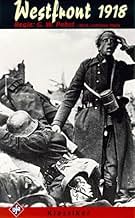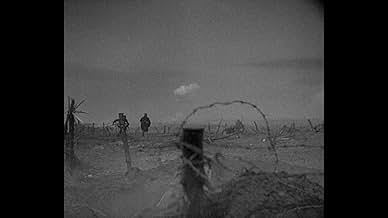IMDb रेटिंग
7.3/10
2.6 हज़ार
आपकी रेटिंग
अपनी भाषा में प्लॉट जोड़ेंA group of German solders fight on the front line in France at the end of World War I.A group of German solders fight on the front line in France at the end of World War I.A group of German solders fight on the front line in France at the end of World War I.
- निर्देशक
- लेखक
- स्टार
- पुरस्कार
- कुल 1 जीत
Hans-Joachim Möbis
- Der Student
- (as H.J. Moebis)
Aribert Mog
- Undetermined Secdondary Role
- (बिना क्रेडिट के)
Gustav Püttjer
- Hamburger
- (बिना क्रेडिट के)
André Saint-Germain
- Undetermined Secondary Role
- (बिना क्रेडिट के)
Vladimir Sokoloff
- Meal Orderly
- (बिना क्रेडिट के)
Ilse Trautschold
- Undetermined Secondary Role
- (बिना क्रेडिट के)
Emil Wabschke
- Undetermined Secondary Role
- (बिना क्रेडिट के)
फ़ीचर्ड समीक्षाएं
The very interesting director, GW Pabst directs a war movie in his first movie with sound, and he uses it to amazing effect. There hardly is a story, just the usual Some Nice Kids Go To War And Find Out That, Gee! War Is Hell! Hokum. The movie is nothing but a sensory experience. The war scenes in this movie are very frighteningly realistic. TO be honest, I have NO idea how he achieved some of the explosion shots. They looked like they were exploding very close to the actors in some scenes. I guess they didn't have actor's unions in those days. LOL..
Film can overextend its welcome, but it depends on what you're looking for, I guess.
Film can overextend its welcome, but it depends on what you're looking for, I guess.
Although this covers the same broad subject matter as "All Quiet", there is a different and welcome perspective and the film making is very definitely more European in style, harder edged and more matter of fact, which I have to say I prefer. For the English speaking audience it does suffer in that it has not been cared for and restored in the same way as "All Quiet". The version I saw had some rather jarring (at least to my English ears) subtitles, which showed that the UK and the USA are indeed two countries divided by a common language. I'm not sure what German words translate as "What in tarnation". Having said that the film was powerful, innovative and quite startling in its use of sound, which we should bear in mind had only been in use for 3 years or so. If someone knows where there is a restored version for the English speaking audience (preferably on DVD) I will be first in the queue
My husband and I just finished seeing this movie. We hadn't heard of it before. We were quite impressed. It's an old movie. It was made just at that time when overacted stage conventions were being abandoned for the more subtle gestures of film. Taking that into account, this movie for us packed quite a wallop.
This is a movie about people attempting to fight a war as a group of small-towners who get to know each other and build a society as they go. Although they don't like the war, they are willing to go and do their part. But can these deep relationships endure in the face of an impersonal war machine? And whose fault is it if they can't? Who is responsible for the situation?
There's a fairly slow start, during which the movie establishes relationships, etc. Then there is a decisive battle. Somehow there isn't another trench warfare movie I can think of which really gets the nuances and habits of the people who were in the trenches in World War I, on either side. We don't have anything like it now. And yet it's not gruesome, so don't be worried about that. I'd definitely recommend this movie, especially in mid-2006 in the U.S. This movie asks all the right questions, subtly but effectively.
This is a movie about people attempting to fight a war as a group of small-towners who get to know each other and build a society as they go. Although they don't like the war, they are willing to go and do their part. But can these deep relationships endure in the face of an impersonal war machine? And whose fault is it if they can't? Who is responsible for the situation?
There's a fairly slow start, during which the movie establishes relationships, etc. Then there is a decisive battle. Somehow there isn't another trench warfare movie I can think of which really gets the nuances and habits of the people who were in the trenches in World War I, on either side. We don't have anything like it now. And yet it's not gruesome, so don't be worried about that. I'd definitely recommend this movie, especially in mid-2006 in the U.S. This movie asks all the right questions, subtly but effectively.
Director G.W. Pabst uses sound well in this, his first sound film. There's the noise of continual bombardment, which adds to the visual realism. Moreover, sound serves continuity. Whistling continues from one scene to another in one transition; in another, the music of a band playing at a canteen turns into the drumbeat for marching soldiers. Also endearing of this antiwar statement is that it is not exciting, unlike other supposedly dovish pictures that end up romanticizing battle. There's the screaming Frenchman between trenches. An artillery firing line is too short, hitting patriot trenches. A return home on leave has a soldier discovering that his wife trades sex to get by.
The framing, editing and visual quality are adept, as one would expect from Pabst, if not from an early sound film. I especially liked the framing and fluidity of the staircase goodbye. There's a surveying moving camera, as there is in "All Quiet on the Western Front". The long battle sequence at the end is the climax of the salient film-making. There is a very long take from an unmoving position, as if the camera were a hidden soldier observing; it is unexciting, yet my attention was not discouraged.
The framing, editing and visual quality are adept, as one would expect from Pabst, if not from an early sound film. I especially liked the framing and fluidity of the staircase goodbye. There's a surveying moving camera, as there is in "All Quiet on the Western Front". The long battle sequence at the end is the climax of the salient film-making. There is a very long take from an unmoving position, as if the camera were a hidden soldier observing; it is unexciting, yet my attention was not discouraged.
This is the story of life in the trenches during World War 1 from the perspective of 4 German soldiers, one of them a Lieutenant. The fact that they are on the 'other' side makes no difference to the feel of the story or the film's message. War is bad.
There is no particular story to focus on. The film is a sequence of events during wartime and it just carries on after the film has ended, just like it was already in existence once the film had started. It does have dramatic segments, eg, the home visit granted to Gustav Diessl (Karl), the exploits involving Hans-Joachim Mobis (the student) and various battlefield situations, confrontations and realizations.
The film occasionally has slow segments but it is interesting from a social history perspective. What was the point of it all?
There is no particular story to focus on. The film is a sequence of events during wartime and it just carries on after the film has ended, just like it was already in existence once the film had started. It does have dramatic segments, eg, the home visit granted to Gustav Diessl (Karl), the exploits involving Hans-Joachim Mobis (the student) and various battlefield situations, confrontations and realizations.
The film occasionally has slow segments but it is interesting from a social history perspective. What was the point of it all?
क्या आपको पता है
- ट्रिवियाThis film was banned by the Nazis after they came into power in Germany in 1933.
- गूफ़The depth of the trenches is inaccurate. In several scenes where the soldiers are standing up, their heads are higher than the top of the trench, making them easy targets for snipers and also allowing the French to monitor troop movements.
- भाव
Woman in rationed food line: What are you doing? Back of the line!
Another Woman in rationed food line: What's wrong with the old cow? Cutting in line!
Man in rationed food line: Leave the woman alone.
Woman cutting in rationed food line: My Adolf is dead.
Woman in rationed food line: Think you're the only one? That's no reason to cut in line. Go to the back!
- कनेक्शनEdited into A Hellish Chaos (2017)
टॉप पसंद
रेटिंग देने के लिए साइन-इन करें और वैयक्तिकृत सुझावों के लिए वॉचलिस्ट करें
- How long is Westfront 1918?Alexa द्वारा संचालित
विवरण
- चलने की अवधि1 घंटा 15 मिनट
- रंग
- पक्ष अनुपात
- 1.20 : 1
इस पेज में योगदान दें
किसी बदलाव का सुझाव दें या अनुपलब्ध कॉन्टेंट जोड़ें


























